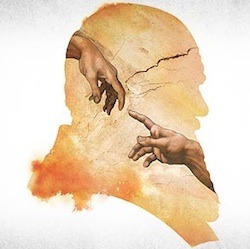Accommodationism, Sean Carroll, and the scope of science and skepticism
 I’ve written before that I don’t like the term “accommodationist,” but, putting unflattering connotations aside, most usages seem to apply to me. I think that, compelling state interests not withstanding, we ought to accommodate citizen’s religious beliefs—for example, by not forcing jewish postal workers to deliver mail on the Sabbath. I also think that evolution does not preclude or disprove the existence of God—theistic evolution doesn’t conflict with naturalistic evolution in any substantive empirical way, so science ought to be more or less agnostic on the issue. And I draw my party lines differently in atheist-theist debates, generally arguing that dogmatism, not religion, is worth criticizing, and that pluralism, secularism, and liberalism in general (not atheism per se) are worth promoting. As such, I follow the generally supported atheist practice of criticizing positions I think are harmful or wrong.
I’ve written before that I don’t like the term “accommodationist,” but, putting unflattering connotations aside, most usages seem to apply to me. I think that, compelling state interests not withstanding, we ought to accommodate citizen’s religious beliefs—for example, by not forcing jewish postal workers to deliver mail on the Sabbath. I also think that evolution does not preclude or disprove the existence of God—theistic evolution doesn’t conflict with naturalistic evolution in any substantive empirical way, so science ought to be more or less agnostic on the issue. And I draw my party lines differently in atheist-theist debates, generally arguing that dogmatism, not religion, is worth criticizing, and that pluralism, secularism, and liberalism in general (not atheism per se) are worth promoting. As such, I follow the generally supported atheist practice of criticizing positions I think are harmful or wrong.
All of this would brand me an “accommodationist” by many atheists, who treat it as a four-letter word. I’ve more or less just come to accept that this is the case, and I spend my time stressing about more important things.
I bring this all up because the philosopher Sean Carroll has a generally insightful post on his blog about the nature of science, and there’s a relevant portion that I think is worth drawing attention to.
I’ve talked about the supernatural issue a couple of times before. Short version: if a so-called supernatural phenomenon has strictly no effect on anything we can observe about the world, then indeed it is not subject to scientific investigation. It’s also completely irrelevant, of course, so who cares? If it does have an effect, than of course science can investigate it, within the above scheme. Why not? Science does not presume the world is natural; most scientists have concluded that the world is natural because that’s the best explanation for what we observe. If you are ever confused about what “science” has to say about something, just ask yourself what actual scientists would do. If real scientists were faced with a purportedly supernatural phenomenon, they wouldn’t just shrug their shoulders because it wasn’t part of their definition of science. They would investigate it and try to come up with the best possible explanation.
I selected this quote for a few reasons (but seriously read the whole post): first, it points out that science doesn’t actually assume the world is natural. Second, as I’ve argued before, a responsible understanding of science doesn’t make evolution incompatible with the existence of God—an idea that many atheists seem to want written into textbooks. And third, because it has some bearing on debates that have been going around skeptical circles about what the appropriate scope of skepticism is.
I like the distinction that Carroll makes about supernatural claims—some have natural effects and some don’t. When skeptics who want to say “skepticism entails atheism” or “skeptics who believe in God are compartmentalizing their religious belief” talk about the scope of skepticism, they often cite supernatural claims of the former kind (ghosts, ESP, miracles) as a way of arguing against claims of the latter kind (theistic evolution, God in general, transsubstantiation). Skepticism addresses ghosts, they argue, so why treat religion as something special?
But of course it’s not quite so simple. Most modern, liberal claims about religion actually seem to make no empirical predictions whatsoever. There’s no scientific way to test them. I’d argue that most religious claims that “accommodationists” are criticized for saying are “off-limits” are just claims that are empirically identical to the natural world. These are the types of claims Sean Carroll says “who cares?” about, and I agree.
Many people like to treat this type of argument as if it reveals some sort of intellectual cowardice—as if skeptics and atheists like me just want to keep religion off-limits solely for political reasons, or because we’re afraid of offending our religious friends. But no one would say “we ought not to hold this claim about this miracle up to skepticism,” or “skeptics ought not touch intelligent design, because that’s a religious claim.” We wouldn’t say that because those are the types of claims that science and skepticism address—claims that have natural and empirical consequences.
This is all just very much to say that I’ve more or less just accepted that I’m going to be branded an accommodationist. But if that’s going to be the case, then I’m going to object really strongly to the idea that accommodationism is political cowardice stemming from anything other than principled and reasoned arguments. I’m sure the atheists who say “science disproves religion” or “evolution and god are incompatible” have reasons for their beliefs; I do, too. So let’s weigh those reasons on their merits, not on uncharitable readings of their motivations.
 Vlad Chituc is a lab manager and research assistant in a social neuroscience lab at Duke University. As an undergraduate at Yale, he was the president of the campus branch of the Secular Student Alliance, where he tried to be smarter about religion and drink PBR, only occasionally at the same time. He cares about morality and thinks philosophy is important. He is also someone that you can follow on twitter.
Vlad Chituc is a lab manager and research assistant in a social neuroscience lab at Duke University. As an undergraduate at Yale, he was the president of the campus branch of the Secular Student Alliance, where he tried to be smarter about religion and drink PBR, only occasionally at the same time. He cares about morality and thinks philosophy is important. He is also someone that you can follow on twitter.



